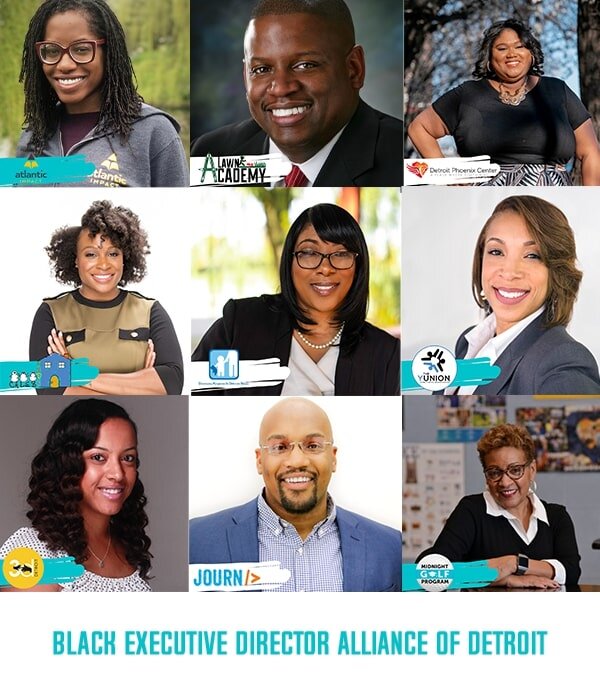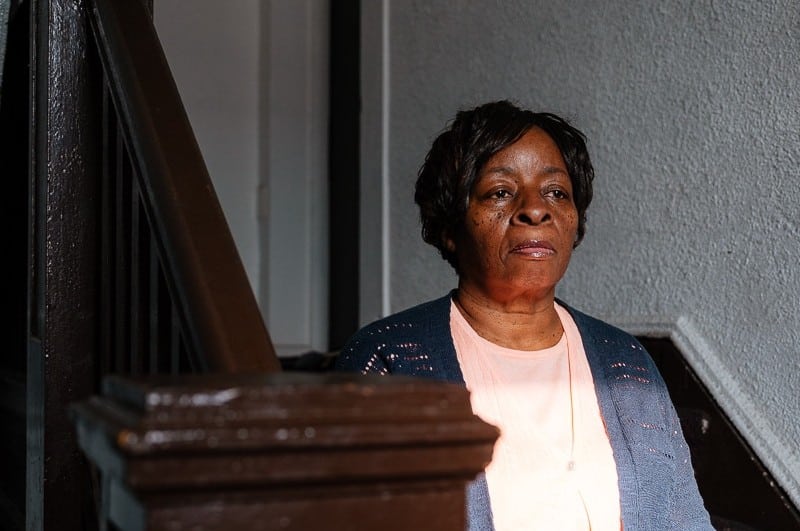Nine nonprofit leaders work together to form the Black Executive Director Alliance of Detroit
“I have a high level of respect for the people involved in this group. They work hard and true to their mission. And I can learn a lot from them, sharing resources and opportunities and contacts,” Kim Johnson says. “This is about supporting each other so we can achieve success. It’s not a competition. It’s about breaking down working in silos.”

Kim Johnson and Anise Hayes, two Black women and leaders of Detroit-based nonprofit organizations, were talking with one another about the nonprofit ecosystem in the city.
As the founders of Developing K.I.D.S. and Atlantic Impact, respectively, Johnson and Hayes have a great deal of experience in the nonprofit world shared between them and they’ve realized some of the same things over the years. A higher level of leadership development is needed, for starters. And, frankly, for a city that has an overwhelmingly Black majority of the population, Johnson and Hayes have noticed that population isn’t necessarily represented in the leadership of Detroit-based nonprofits.
“It’s important for kids to see leaders of color,” Johnson says. “As a child, most of the leaders I saw were not people of color. These were great people but representation matters.”
By their third or fourth conversation about it, Johnson and Hayes shared that other Black leaders had similar experiences, too. So much so that they thought it was time to do something about it.
The Black Executive Director Alliance of Detroit was formed in the fall of 2020. The organization comprises nine of the city’s Black nonprofit leaders, eight of whom were the founders of their respective organizations.
“There’s a need for equity in the nonprofit world and especially in terms of funding. We have to make sure that we work around the clock to lift each other up,” Johnson says. “Personally, I’m often tasked with providing advice to other nonprofits asking about things like funding. I’ve been successful and they want to know how it happens. So there’s definitely some peer mentoring among us.”
The Black Executive Director Alliance of Detroit includes Tiffany Brown, founder and executive director of Developing Despite Distance; Reneé Fluker, founder and president of the Midnight Golf Program; Richard Grundy, co-founder and CEO of JOURNi; Anise Hayes, founder and executive director of Atlantic Impact; Kiesha Jackson, founder and executive director of Caleb’s Kids; Kim Johnson, founder, president, and CEO of Developing K.I.D.S.; Eric Miller, founder and president of The Lawn Academy; Courtney Smith, founder and CEO of Detroit Phoenix Center; and Nicole Wilson, executive director of The Yunion.
Each of the nine nonprofits represented are youth-serving organizations. As part of the Black Executive Director Alliance of Detroit, or BEDAD for short, each organization remains independent yet works with one another to ensure each other’s success.
“I have a high level of respect for the people involved in this group. They work hard and true to their mission. And I can learn a lot from them, sharing resources and opportunities and contacts,” Johnson says.
“This is about supporting each other so we can achieve success. It’s not a competition. It’s about breaking down working in silos.”
In creating BEDAD, the nine founding members can benefit from one another’s experience and the sharing of resources. But just as important, and if you ask them, likely more so, it’s the young people that they serve who stand to benefit the most.
“If I’m working with a young person that’s needing housing, I can tap one of our members. Or if a young person is heavy into technology, I can tap another,” Johnson says.
“It’s creating a network where we’re supporting every aspect of a child’s life and making sure that no one is slipping through the cracks. One young person might get toiletries from one organization, transportation needs from another. It’s a fact that young people getting support are more likely to graduate.
“Each group provides something of value.”
Over the next year, Johnson says that BEDAD will continue to formalize the group and how they work together, to build a leadership foundation. They plan to create a strategy of self-care for themselves and their staff, to identify executive level training opportunities, to create collaborative projects, and to find funding for the organization itself and each other.
In 2022, a new cohort of nine leaders will be announced. The founding nine will stay on as consultants, offering the support and mentorship that they themselves sought.
“It’s important to me to mentor the next group of leaders because I know how hard it is to start a nonprofit,” Johnson says.
“For years I was working full-time in addition to leading my nonprofit. If I got any money I would use it to pay everyone else first. But I love this work and I love the reason I started this work. I want to do whatever I can so someone else in the community doesn’t have the same struggles I did.
“You’re supposed to leave the world better than you found it.”




